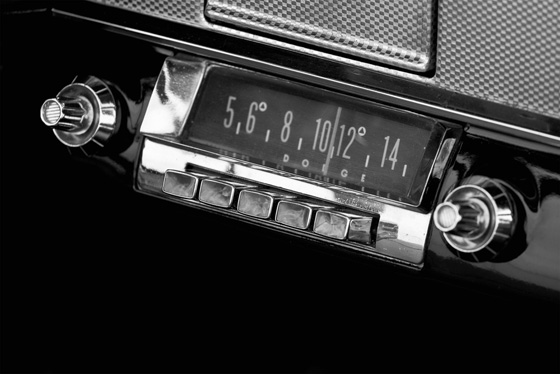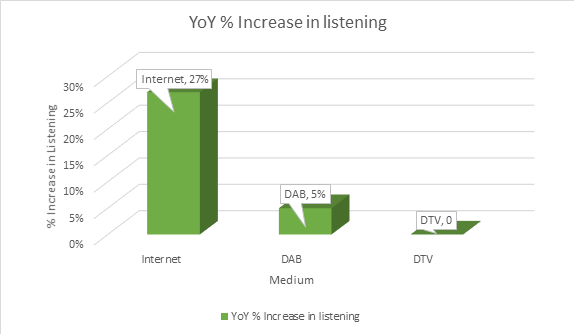‘Cars will have radios in 2015’
Roger Lanctot, thought-leader in the connected-car space, has recently made this prediction: that cars in 2015 will have radios. Now, that might seem a little bit obvious at first glance, but with the increasing rise of online audio streaming services and podcasts, it may look as though radio is in danger. But we disagree. Radio, across its various platforms, is here to stay – it’s just evolving.
There is something about silence in a car that is discomforting and awkward. A silent car with passengers puts strains on social etiquette as you grapple for something inane to say. We need audio in our cars. But AM/FM radio is struggling to maintain its presence as the UK may or not be poised on the brink of a national DAB switchover. The glitch with AM/FM? The hissing and crackling of radio white noise, which is an infuriating and teeth-grinding experience. It was all very well listening to your favourite Capital FM while you whizzed around London, but dare to venture into a neighbouring home county and you’d be met with white noise and no choice but to browse for a local radio’s reception, or switch to a CD.
And it’s not just DAB that’s threatening AM/FM – younger generations are becoming increasingly dependent on and attached to their mobile devices, increasing radio listening among mobile users. And at this year’s Consumer Electronics Show, a new potential craze really came to the fore – the connected car.
Both the CES, held in Las Vegas this year, and the North American International Auto Show in Detroit – dubbed the ‘Motor City’ – aimed their focus on the future of the connected-car and the probability of bringing this concept one step closer to consumer production. And whilst Mercedes-Benz’s self-driving model is a stretch beyond our imagination and not due to hit any car dealerships any time soon, the first connected-cars may well be on roads this year. And as the name suggests, they are connected to the internet.
Connected cars, with their fancy apps, could make the radio obsolete as they sidle over to the dark side of music streaming services. Rdio, one such service, is to pair up with Bosch, an interface manufacturer for connected cars. In Jaguars and Land Rovers, which use Bosch’s system, Rdio will be the only subscription music app. Except that the automakers are also planning on partnering with Apple and their own connected-car system, Carplay. Add into this mix Spotify, Pandora, and Google’s Android Auto and it’s all a bit of a kerfuffle from the business perspective.
But whilst streaming services are cool and popular, there are two fundamental downsides to having them in your car as a radio replacement. Firstly, streaming services could potentially be a hazard to drivers. Think about how frequently you flick through a playlist to get to the song you want, and then compare that to how frequently you’d flick through radio stations. That’s extra seconds of attention taken off the road. Secondly, there can be no denying that radio is the original social medium. Real-time traffic updates, weather reports, the latest news – just the sound of two presenters nattering away at each other makes us feel more connected and part of the world, unlike streaming, which is automated, impersonal, and cold.
And let’s not forget mobile radio. Hundreds – thousands – of radio stations worldwide can be accessed anywhere by anybody on their mobile while they’re mobile. Pair this with the connected car, and all of the relevance that radio in a connected car can deliver can be offered today. For example, imagine having the most relevant and up-to-date traffic information to where you are travelling, or an offer from the service station at the exit you are approaching – something that music streaming services cannot provide. The relevance that being connected can add to the radio experience has the potential for stations to build even more loyal listeners. After all, radio have been voted as the most important feature for new car buyers, alongside connectivity. A mobile radio may be the best solution for broadcasters, advertisers, listeners, and automakers.
Another reason for radio to stay: radio listeners are less likely to switch channels during adverts than television audiences. Which, combined with the potential to deliver highly relevant ads to the listener, is golden news for advertisers.
This is the concept that drives Exaget’s forward-thinking technology. Using a refined blend of database-analysing technology and a dash of common sense, we are able to create an overall profile of a radio listener, and target relatable adverts their way. Adverts that are not only compatible with the radio station, but with the radio listener themselves. The interaction does not just consist of ‘sports radio = listener more likely to be a man = insert ad for booking a test drive’, but also works on a ‘listener-radio station-advertiser’ relationship platform, adding value to all three parties involved.
But with cars looking to become connected to the internet of things in the foreseeable future, who’s to say that mobile radio, with its interactive and relevant ads, won’t make a progression onto dashboards? But if that’s a bit too futuristic for you to digest right now, you can at least take away this with you – radio is here to stay. It’s just in the process of getting a face lift. It may or may be DAB; it will more likely be mobile; but it will still be ‘the radio’.
If you are interested in becoming a broadcasting partner, or would like to know what our integrating technology can do for you, contact our Partnership Account Manager Matthew Layton –matthew.layton@exaget.com or +447533517396
If you are interested in advertising opportunities, please contact the CEO of Exaget, Shankar Meembat –shankar.meembat@exaget.com or +447411130680






Radio Round-Up: Exaget Week in Review
February 12, 2015
Last week we dedicated our Week in Review to the Super Bowl and its (lack of) digital advertising.
This week, it’s the turn of the radio industry, as we look at some station changes, new faces, and a transformation to the UK’s Official Albums Chart that reflects changing listening habits.
Read all about it:
TalkSport founder in bid to launch rival station
Kelvin MacKenzie, founder of TalkSport radio, has decided that it’s about time that his original founding station, which was sold to UTV for £98m a decade ago, had a competitor – and one that he would create himself. MacKenzie’s new station, called Sports Radio, is part of a Listen2Digital bid to run a second national commercial multiplex. If Listen2Digital wins their license, Sports Radio would be due for launch in January next year. MacKenzie was quoted saying, ‘It’s been clear to me for some time that there’s room for another player in the sports radio market. In capitalism, when there’s one there should be two.’
Streaming to be included in Albums Chart
Switching on the radio on Sunday afternoons to listen to the latest Albums Chart was as important a social gathering as the Sunday roast. But these days, it’s out with the CDs and cassettes and in with audio streams. For the first time, as of next month, audio streams will count towards the Official Album Charts, with data hailing from Spotify, Deezer, Napster, Google Play, O2 Tracks, Rdio and Xbox Music – all those music streaming services that we are being inundated with. Downloads and CD sales will still count; but the way audiences consume music nowadays is changing drastically, and with CD sales on the decrease while audio streaming steadily rises in popularity, it’s time that one of the UK’s institutional radio listening habits got a bit of a revamp.
Panjab Radio joining Bradford and Huddersfield
The Bradford and Huddersfield multiplex will be getting two new stations on board in the next couple of weeks – Asian radio stations Panjab Radio and Asian Sound Radio. Panjab Radio will be reaching its audiences on DAB across Birmingham, Coventry and Wolverhampton, broadcasting in Panjabi and English languages. Asian Sound Radio, meanwhile, is set to expand its East Lancashire service in the next two months.
Tom Russell joins RockSport
RockSport DAB Radio station is all about just that – rock music and sport. (And, if we may do a bit of showing off, they’re one of our broadcasting partners too). Following their rebrand from Eklipse Sport Radio earlier in January, they will now be joined by former XFM, Real XS and Radio Clyde presenter – Tom Russell. He’ll be hosting the weekend mid-mornings, so be sure to tune in for your dose of sports talk and rock’n’roll.
If you are interested in becoming a broadcasting partner, or would like to know what our integrating technology can do for you, contact our Partnership Account Manager Matthew Layton – matthew.layton@exaget.com or +447533517396
If you are interested in advertising opportunities, please contact the CEO of Exaget, Shankar Meembat –shankar.meembat@exaget.com or +447411130680